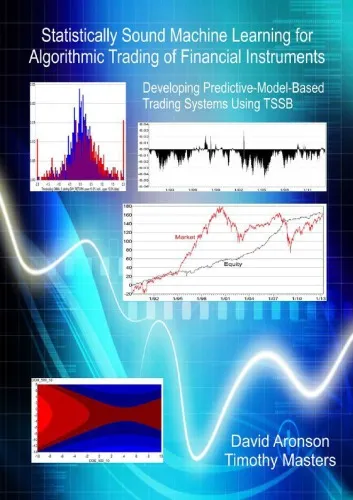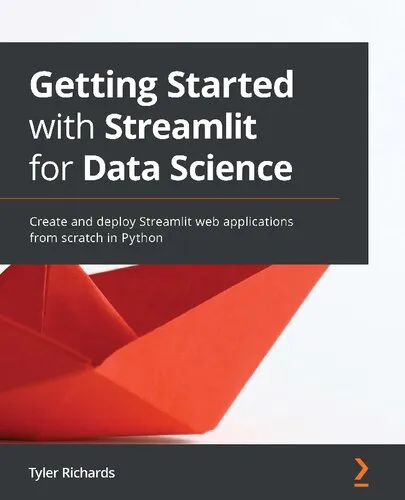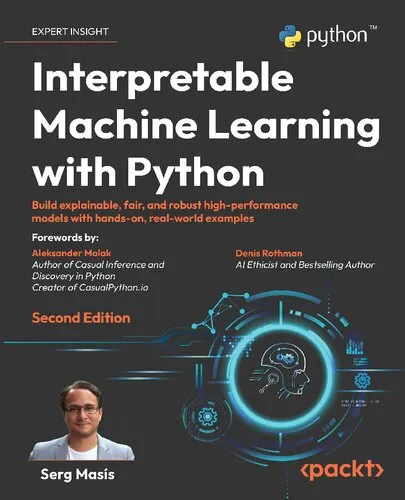Statistically sound machine learning for algorithmic trading of financial instruments
4.2
بر اساس نظر کاربران

شما میتونید سوالاتتون در باره کتاب رو از هوش مصنوعیش بعد از ورود بپرسید
هر دانلود یا پرسش از هوش مصنوعی 2 امتیاز لازم دارد، برای بدست آوردن امتیاز رایگان، به صفحه ی راهنمای امتیازات سر بزنید و یک سری کار ارزشمند انجام بدینکتاب های مرتبط:
معرفی کتاب
کتاب «Statistically Sound Machine Learning for Algorithmic Trading of Financial Instruments» نوشته دیوید آرونسون و تیموتی مسترز، یک راهنمای جامع، دقیق، و عملی برای معاملهگران و تحلیلگرانی است که تمایل دارند از روشهای تحلیل آماری و Machine Learning در بازارهای مالی استفاده کنند. این کتاب به صورت گامبهگام به آموزش روشهای علمی طراحی، آزمایش، و پیادهسازی استراتژیهای معاملاتی مبتنی بر داده میپردازد.
خلاصهای از کتاب
این کتاب در سه بخش اصلی سازماندهی شده است: مبانی Machine Learning و کاربرد آنها در معاملات الگوریتمی، تست فرضیهها و ایجاد مدلی مطمئن با دادههای مالی، و در نهایت اجرا و بهینهسازی عملی این مدلها در بازار. در بخش اول، نویسندگان نگاهی دقیق به اصول پایه Machine Learning انداخته و نحوه استفاده از این ابزارها برای جمعآوری دادههای کاربردی و ایجاد مدلهای منطقی را توضیح میدهند. در بخش دوم، مفاهیم اعتبارسنجی دادهها، انتخاب ویژگیها، و روشهای کاهش overfitting به طور کامل بررسی میشوند. در بخش نهایی، نویسنده نحوه تست مدلها در دادههای واقعی و ایجاد یک روند معاملاتی منطقی و «از نظر آماری صحیح» را ارائه میدهد.
نکات کلیدی کتاب
- توضیح مبانی Machine Learning و تحلیل داده برای ساخت استراتژیهای معاملاتی.
- تمرکز ویژه بر روشهای آزمونگیری صحیح از مدلها برای اطمینان از نتایج واقعی و اجتناب از overfitting.
- ارائه ابزارها و تکنیکهای لازم برای تبدیل دادههای مالی خام به اطلاعات قابل استفاده در معاملات الگوریتمی.
- آموزش نحوه طراحی و پیادهسازی معاملات الگوریتمی که بر پایه آماری دقیق بوده و در زمان واقعی کارکرد دارند.
نقل قولهای معروف از کتاب
“Only statistically valid and scientifically tested strategies with proper validation procedures can generate consistent trading profits in the long run.”
“The essence of algorithmic trading is not in chasing patterns but in understanding and harnessing the statistical characteristics of the markets.”
چرا این کتاب مهم است
بازارهای مالی امروز با حجم بالایی از دادهها و پیچیدگیهای فزاینده مواجه هستند. برای موفقیت در این محیط، نیاز به دانش و ابزارهایی داریم که بتوانند حجم عظیمی از دادهها را تحلیل کرده و اطلاعات مفیدی ارائه دهند. این کتاب پاسخی است به این نیازها؛ چرا که با استفاده از Machine Learning و روشهای علمی به معاملهگران کمک میکند تا تصمیمات خود را بر پایه دادهها و تحلیلهای آماری بگیرند. اهمیت این کتاب از آن جا ناشی میشود که نه تنها مفاهیمی تئوری را توضیح میدهد، بلکه راهحلهای عملی نیز ارائه میکند و به کاربران نشان میدهد که چگونه مدلهایی بسازند که در عمل نیز کارایی داشته باشند.
Introduction to Statistically Sound Machine Learning for Algorithmic Trading
With the rapid evolution of financial markets and the explosion of computational capabilities, algorithmic trading has become an indispensable component of the modern financial landscape. "Statistically Sound Machine Learning for Algorithmic Trading of Financial Instruments" equips traders, quants, and data scientists with the methodologies and frameworks needed to build robust, profitable, and scientifically valid trading algorithms. This book bridges the gap between financial markets and machine learning by combining statistical rigor and practical implementation, helping readers avoid common pitfalls while leveraging the power of advanced computing.
Readers come to this book seeking more than a superficial application of machine learning techniques to financial trading. They demand a comprehensive guide that not only explains the "how" but also the "why" behind each decision in the modeling process. This book delivers, offering systematic approaches for constructing, testing, and deploying sound machine learning (ML) models specifically designed for trading various financial instruments.
Detailed Summary of the Book
This book is structured around a comprehensive roadmap for implementing machine learning in algorithmic trading, with an unwavering emphasis on statistical soundness and real-world applicability. It starts by laying a foundation in statistical principles, ensuring readers develop a strong understanding of the core concepts before delving into machine learning techniques.
The initial chapters provide an overview of financial markets and trading strategies, underscoring the inherent challenges in modeling financial data, such as high noise and non-stationarity. This segues into a deep dive into statistical validation, where readers learn to differentiate between randomness and true market patterns through proper hypothesis testing and data science methodologies.
The book then introduces machine learning algorithms, including both supervised and unsupervised methods, while illuminating the nuances of applying these tools to noisy financial datasets. Each technique is presented not only with theory but with practical examples, including feature engineering, hyperparameter optimization, and performance evaluation. The authors also discuss advanced methodologies such as ensemble methods and deep learning, highlighting their specific role in capturing complex market relationships.
Beyond model construction, a major focus is given to backtesting, avoiding overfitting, and ensuring robustness in live trading environments. The book concludes with discussions on risk management, portfolio optimization, and the ethical implications of leveraging machine learning in the financial domain.
Key Takeaways
- Understand the challenges posed by financial data, including issues like overfitting, noise, and data snooping bias.
- Build a statistically rigorous foundation that ensures sound model evaluation and validation techniques.
- Learn to apply machine learning techniques tailored specifically for financial trading, such as feature engineering and ensemble models.
- Master backtesting methodologies and avoid common pitfalls that plague algorithmic traders.
- Develop a strong grasp of portfolio optimization, risk management, and ethical considerations in trading algorithms.
Famous Quotes from the Book
“The goal is not to maximize in-sample predictive accuracy, but to create models that generalize effectively to out-of-sample data—a crucial distinction for algorithmic trading.”
“Financial markets are rife with noise, and extracting alpha is akin to finding a signal buried in the static. It requires both statistical discipline and creative ingenuity.”
“Backtesting is not just a step in model development; it is the crucible where robust strategies are forged and overfit models are discarded.”
Why This Book Matters
In a world where financial technologies are advancing at breakneck speeds, the need for statistically sound practices in algorithmic trading has never been greater. This book matters because it provides a much-needed framework for developing trading algorithms that are not only effective but also statistically robust, ensuring they can perform in live markets while withstanding the scrutiny of changing conditions.
What sets this book apart is its focus on bridging theory and practice. While many texts either dive too deeply into esoteric theory or oversimplify techniques, this book strikes the perfect balance, making it accessible to both experienced professionals and aspirants new to the domain. With its insistence on rigor, it equips readers to create strategies that are not just profitable in backtests but practical and reliable in real time.
Additionally, the authors emphasize ethical considerations, urging practitioners to recognize the wider implications of their work in algorithmic trading and their responsibility in influencing financial markets. This holistic approach ensures that readers not only excel in their craft but also contribute positively to the trading ecosystem.
دانلود رایگان مستقیم
شما میتونید سوالاتتون در باره کتاب رو از هوش مصنوعیش بعد از ورود بپرسید
دسترسی به کتابها از طریق پلتفرمهای قانونی و کتابخانههای عمومی نه تنها از حقوق نویسندگان و ناشران حمایت میکند، بلکه به پایداری فرهنگ کتابخوانی نیز کمک میرساند. پیش از دانلود، لحظهای به بررسی این گزینهها فکر کنید.
این کتاب رو در پلتفرم های دیگه ببینید
WorldCat به شما کمک میکنه تا کتاب ها رو در کتابخانه های سراسر دنیا پیدا کنید
امتیازها، نظرات تخصصی و صحبت ها درباره کتاب را در Goodreads ببینید
کتابهای کمیاب یا دست دوم را در AbeBooks پیدا کنید و بخرید
1142
بازدید4.2
امتیاز0
نظر98%
رضایتنظرات:
4.2
بر اساس 0 نظر کاربران
Questions & Answers
Ask questions about this book or help others by answering
No questions yet. Be the first to ask!






![The Ultimate iOS Interview Playbook: Conquer Swift, frameworks, design patterns, and app architecture [Team-IRA]](https://s3.refhub.ir/images/thumb/The_Ultimate_iOS_Interview_Playbook__Conquer__29925.webp)







